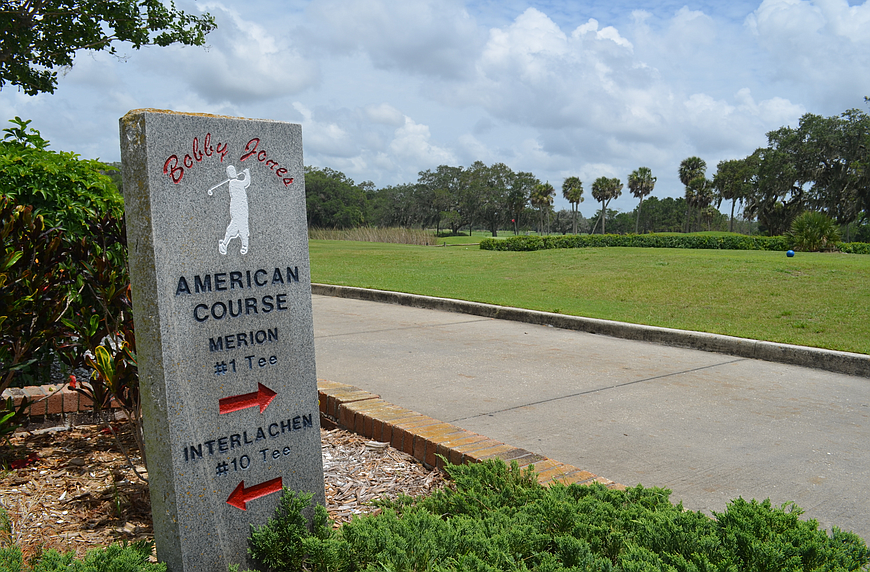- March 16, 2025
-
-
Loading

Loading

At a special meeting held Monday to discuss the future of the city-owned Bobby Jones Golf Club, the City Commission decided to adjourn before reaching a consensus on how to proceed with a forthcoming renovation project for the facility.
As a result, plans for the 45-hole municipal course remain uncertain until the board revisits the conversation. The commission’s indecision — and the prospect of eventually adjusting the scope of the project — could lead to a delay in construction, originally planned to begin in April 2020.
During Monday’s meeting, commissioners signaled some interest in reversing course from the plans the city previously endorsed. In December, the commission backed a project that would improve all 45 holes at the 293-acre facility, an undertaking estimated to cost $18 million.
Since then, the city obtained financial projections that suggested the course would lose millions of dollars in the wake of that project. In July, the commission asked a consultant to produce options for a plan that would reduce the footprint of the golf course. Ahead of Monday’s meeting, City Manager Tom Barwin recommended downsizing Bobby Jones to 27 or 18 holes, stating a smaller project would minimize the city’s financial risk.
Richard Singer, director of consultant services for the National Golf Foundation, echoed Barwin’s perspective at Monday’s meeting. Singer said that, over the course of a 15-year bond repayment, external factors such as a recession or bad weather could affect the performance of Bobby Jones. If the city went forward with a larger project, Singer said, those external factors could have a larger effect on the municipal budget.
“It all boils down to your risk tolerance as a city,” Singer said.
Singer noted the course is not self-sustaining in any of the scenarios under consideration while the city is still making debt service payments on a bond for the project.
“They’re all in the red,” Singer said. “They’re all significantly in the red.”
Although the commission was open to the possibility of reducing the size of the golf course, board members offered different perspectives on the appropriate number of holes. Commissioner Jen Ahearn-Koch offered her support for retaining 27 regulation holes and a 9-hole short course, the option that offered the least significant losses for the city in Singer’s projections. The estimates said the city would lose $509,000 and $848,600 annually between fiscal years 2022 and 2028 under that scenario.
Ahearn-Koch suggested the city might even be able to make the project budget-neutral if it were able to generate another 15-20% in revenue at the course, but Singer pushed back against that level of optimism.
“I’m not going as far as saying it won’t cost you,” Singer said. “You absolutely could do better than this. You could also do worse.”
Commissioner Hagen Brody, long a critic of the 45-hole renovation plans, suggested the city should reduce the size of the golf course to 18 holes. Brody said the city could use the rest of the site to create a park with walking trails and other light recreation options.
“We can create a property that has a place for everyone,” Brody said.
Other commissioners did not have the opportunity to make their preferences clear. The board discussed the merits of different figurations, debating whether to include 18 or 27 regulation holes and if a shorter nine-hole course should be incorporated into the facility.
The meeting was scheduled to end at 9 p.m. The commission twice extended the length of its meeting — first to 9:15 p.m., then to 9:30 p.m. — but declined to stay beyond that final deadline. Brody and Commissioner Shelli Freeland Eddie voted against adjourning.
Golf architect Richard Mandell, the consultant the city hired to design the renovation project, said plans would have to be overhauled if the commission chose to do anything other than an 18- or 45-hole course. Mandell said adjusting the plans would require the project to start later than currently scheduled.
Because the city planned to close Bobby Jones in April to begin construction, Barwin said keeping the course open would require an adjustment to the 2019-20 budget. Barwin said the course could need a $600,000 subsidy from the general fund if it stays open through the end of next fiscal year, though he was hopeful the city could offset those costs by obtaining grants if necessary.
“I would say the timing is pretty important,” Barwin said.
After the meeting, Brody expressed frustration the commission wasn’t willing to stay later to come to a decision Monday. He noted Singer and Mandell both traveled from outside the city to be present for the meeting, and their attendance isn’t guaranteed when the commission continues its discussion.
“We had everyone in the room,” Brody said.
Ahearn-Koch and Mayor Liz Alpert both expressed some concern about moving too quickly toward a decision on significant changes to a major project. Barwin distributed the latest business plans analyzing the prospect of downsizing to 18 or 27 holes on Aug 16.
Even if the commission came to a decision Monday, Alpert said the city was facing a construction delay if it chose a 27- or 36-hole configuration for Bobby Jones.
“We're already held up no matter what,” Alpert said.
The commission will resume its conversation about Bobby Jones at a future date yet to be determined.